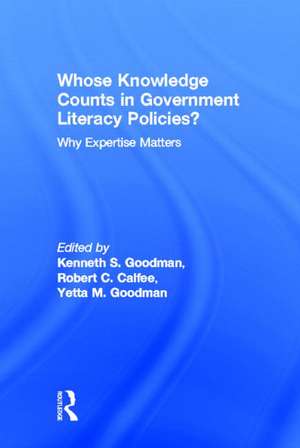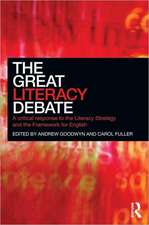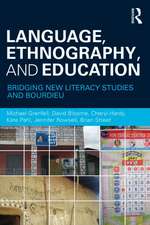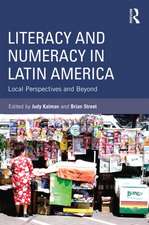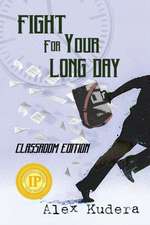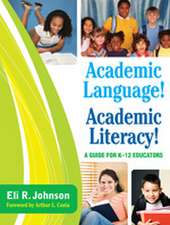Whose Knowledge Counts in Government Literacy Policies?: Why Expertise Matters
Editat de Kenneth S. Goodman, Robert C. Calfee, Yetta M. Goodmanen Limba Engleză Hardback – 24 sep 2013
| Toate formatele și edițiile | Preț | Express |
|---|---|---|
| Paperback (1) | 397.88 lei 6-8 săpt. | |
| Taylor & Francis – oct 2013 | 397.88 lei 6-8 săpt. | |
| Hardback (1) | 1109.18 lei 6-8 săpt. | |
| Taylor & Francis – 24 sep 2013 | 1109.18 lei 6-8 săpt. |
Preț: 1109.18 lei
Preț vechi: 1352.65 lei
-18% Nou
Puncte Express: 1664
Preț estimativ în valută:
212.34€ • 218.50$ • 178.99£
212.34€ • 218.50$ • 178.99£
Carte tipărită la comandă
Livrare economică 01-15 martie
Preluare comenzi: 021 569.72.76
Specificații
ISBN-13: 9780415858007
ISBN-10: 0415858003
Pagini: 238
Ilustrații: 4 tables
Dimensiuni: 152 x 229 x 18 mm
Greutate: 0.45 kg
Ediția:New.
Editura: Taylor & Francis
Colecția Routledge
Locul publicării:Oxford, United Kingdom
ISBN-10: 0415858003
Pagini: 238
Ilustrații: 4 tables
Dimensiuni: 152 x 229 x 18 mm
Greutate: 0.45 kg
Ediția:New.
Editura: Taylor & Francis
Colecția Routledge
Locul publicării:Oxford, United Kingdom
Cuprins
CONTENTS
Foreword: Joel Spring
Acknowledgments
Chapter 1: Introduction: Knowledge, Evidence, and Faith: How the Federal Government Used Science to Take Over Public Schools, Robert Calfee
Part 1: The Political Realties
Chapter 2: Whose Knowledge Counts? The Pedagogy of the Absurd, Kenneth S. Goodman
Chapter 3: Re-reading Poverty; Reorienting Educational Policy, Patrick Shannon
Chapter 4: Neoliberal and Neoconservative Literacy Education Policies in Contemporary France, Jacques Fijalkow
Chapter 5: Flying Blind: Government Policy on the Teaching of Reading in England and Research on Effective Literacy Education, Henrietta Dombey
Chapter 6: Whose Knowledge Counts, For Whom, In What Circumstances?: The Ethical Constraints on Who Decides, Sue Ellis
Chapter 7: About the Dubious Role of Phonological Awareness in the Discussion of Literacy Policies, Renate Valtin
Part 2: Aspects of Literacy: The Knowledge Base
Chapter 8: The Role of Story and Literature in a World of Tests and Standards, Kathy G. Short
Chapter 9: The Staircase Curriculum: Whole-School Collaboration to Improve Literacy Achievement, Kathryn H. Au and Taffy E. Raphael
Chapter 10: Diversity in Children's Literature: What Does It Matter in Today's Educational Climate? Rudine Sims Bishop
Chapter 11: Examining Three Assumptions about Text Complexity: Standard 10 of the Common Core State Standards, Elfrieda H. Hiebert and Katie Van Sluys
Chapter 12: The Role of Literature and Literary Reasoning in English Language Arts and English Classrooms, Judith A. Langer
Chapter 13: Writing Teachers: The Roles Exploration, Evaluation, and Time Play in Their Lives, Jane Hansen
Chapter 14: What Do Children Need to Succeed in Early Literacy—And Beyond? William H. Teale, Jessica L. Hoffman, and Kathleen A. Paciga
Chapter 15: The Impact of Changing Conceptions of Language on Curriculum and Instruction of Literacy and the Language Arts, David Bloome and Melissa Wilson,
Comments: Nu!.... So!... Where do We Go from Here? Yetta M. Goodman
List of Contributors
Foreword: Joel Spring
Acknowledgments
Chapter 1: Introduction: Knowledge, Evidence, and Faith: How the Federal Government Used Science to Take Over Public Schools, Robert Calfee
Part 1: The Political Realties
Chapter 2: Whose Knowledge Counts? The Pedagogy of the Absurd, Kenneth S. Goodman
Chapter 3: Re-reading Poverty; Reorienting Educational Policy, Patrick Shannon
Chapter 4: Neoliberal and Neoconservative Literacy Education Policies in Contemporary France, Jacques Fijalkow
Chapter 5: Flying Blind: Government Policy on the Teaching of Reading in England and Research on Effective Literacy Education, Henrietta Dombey
Chapter 6: Whose Knowledge Counts, For Whom, In What Circumstances?: The Ethical Constraints on Who Decides, Sue Ellis
Chapter 7: About the Dubious Role of Phonological Awareness in the Discussion of Literacy Policies, Renate Valtin
Part 2: Aspects of Literacy: The Knowledge Base
Chapter 8: The Role of Story and Literature in a World of Tests and Standards, Kathy G. Short
Chapter 9: The Staircase Curriculum: Whole-School Collaboration to Improve Literacy Achievement, Kathryn H. Au and Taffy E. Raphael
Chapter 10: Diversity in Children's Literature: What Does It Matter in Today's Educational Climate? Rudine Sims Bishop
Chapter 11: Examining Three Assumptions about Text Complexity: Standard 10 of the Common Core State Standards, Elfrieda H. Hiebert and Katie Van Sluys
Chapter 12: The Role of Literature and Literary Reasoning in English Language Arts and English Classrooms, Judith A. Langer
Chapter 13: Writing Teachers: The Roles Exploration, Evaluation, and Time Play in Their Lives, Jane Hansen
Chapter 14: What Do Children Need to Succeed in Early Literacy—And Beyond? William H. Teale, Jessica L. Hoffman, and Kathleen A. Paciga
Chapter 15: The Impact of Changing Conceptions of Language on Curriculum and Instruction of Literacy and the Language Arts, David Bloome and Melissa Wilson,
Comments: Nu!.... So!... Where do We Go from Here? Yetta M. Goodman
List of Contributors
Recenzii
"Curriculum and policy are informed by assumptions about what counts as knowledge, grounded in notions of human nature, and affected by determinations about whose knowledge counts in the construction and delivery of knowledge in formal educational settings. The diversity of ideas offered within the book affords the reader a rich opportunity to consider foundational issues of policy and practice. Summing up: Recommended. All readership levels." - J.A. Helfer, Illinois State Board of Education, in CHOICE, August 2014
"Part II explores many important aspects of literacy teaching, including the curriculum, text complexity, the role of children’s literature, diversity in children’s literature and the roles of writing teachers." - Margaret Clark, Newman University - Birmingham, Education Journal
“Finally! A book that offers smart thinking about federal literacy education policies by the professionals who know literacy best…. This book connects the dots between current literacy policies, who is writing those policies, and what ultimately happens when the policies are implemented in school classrooms. These international scholars provide glimpses of parallel events happening around the world, beg us to question why knowledge about literacy research is being ignored, and challenge us to consider who really gains when “science” is valued over knowledge.” - Renita Schmidt, The University of Iowa, USA
"A thorough critique of government literacy policies ... Whose Knowledge Counts not only confirms the need for policy makers to work with literacy experts, but from a larger perspective, it re-emphasizes the need for families, educators, scholars, researchers, and policy makers to work in tandem to bring meaningful change that keeps the focus on the betterment of all human beings." - Teachers College Record
"Part II explores many important aspects of literacy teaching, including the curriculum, text complexity, the role of children’s literature, diversity in children’s literature and the roles of writing teachers." - Margaret Clark, Newman University - Birmingham, Education Journal
“Finally! A book that offers smart thinking about federal literacy education policies by the professionals who know literacy best…. This book connects the dots between current literacy policies, who is writing those policies, and what ultimately happens when the policies are implemented in school classrooms. These international scholars provide glimpses of parallel events happening around the world, beg us to question why knowledge about literacy research is being ignored, and challenge us to consider who really gains when “science” is valued over knowledge.” - Renita Schmidt, The University of Iowa, USA
"A thorough critique of government literacy policies ... Whose Knowledge Counts not only confirms the need for policy makers to work with literacy experts, but from a larger perspective, it re-emphasizes the need for families, educators, scholars, researchers, and policy makers to work in tandem to bring meaningful change that keeps the focus on the betterment of all human beings." - Teachers College Record
Notă biografică
Kenneth S. Goodman is Professor Emeritus, Language, Reading and Culture, University of Arizona, USA.
Robert C. Calfee is Professor Emeritus, Stanford University School of Education, USA.
Yetta M. Goodman is Regents Professor Emerita, Language, Reading and Culture, University of Arizona, USA.
Robert C. Calfee is Professor Emeritus, Stanford University School of Education, USA.
Yetta M. Goodman is Regents Professor Emerita, Language, Reading and Culture, University of Arizona, USA.
Descriere
Whose knowledge is considered in framing government literacy policies which mandate accountability, in the form of standardized test scores? This book examines the degree to which expertise is being ignored and pseudo-science becoming the basis for literacy policies and laws.
